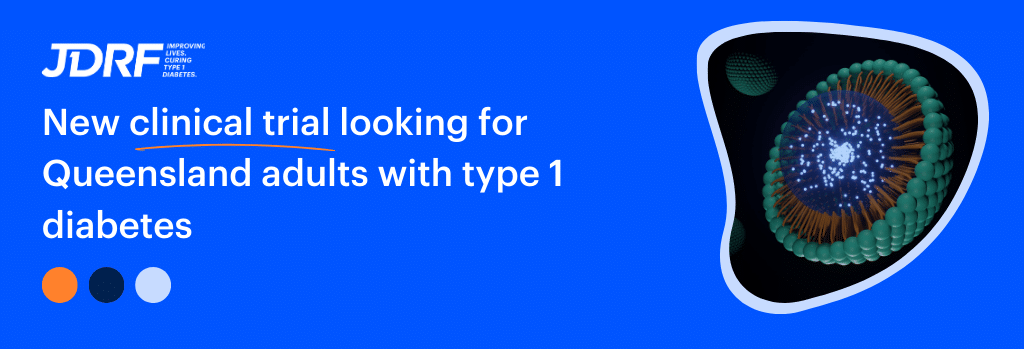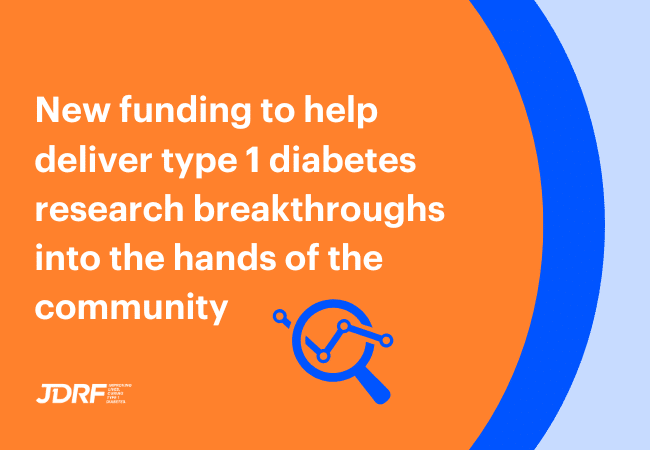New clinical trial looking for Queensland adults with type 1 diabetes
A new trial called the ASITI-201 Study is looking for participants based in Queensland to test a potential new therapy for type 1 diabetes (T1D). The therapy is designed to stop the immune system attack that characterises the condition.
T1D is an autoimmune condition where the immune system mistakenly attacks the insulin-producing beta cells of the pancreas. This means someone with T1D loses the ability to produce their own insulin, and instead relies on administering or injecting insulin to live.
Many researchers hope that by “retraining” the immune system to not attack the body, we may find a way to prevent T1D or minimise the damage to beta cells if the condition is treated early on.
The ASITI-201 Study is aiming to do just that, testing the safety and characteristics of a new drug which could stop or slow down the immune system’s attack of beta cells. The trial is looking for 36 Queensland adults diagnosed with T1D in the past five years. It is based at Princess Alexandra Hospital, Brisbane and is headed up by world leading immunologist Professor Ranjeny Thomas from the University of Queensland.
What will the study involve?
ASITI–201 is a new drug made up of proteins and a form of Vitamin D, encased within small lipid nanospheres. When tested in pre-clinical models this drug was shown to reprogram the immune system to better recognise and protect beta cells from immune attack. This allowed the beta cells to keep on producing insulin for longer.

ASITI-201 is a new therapy made up of proteins and a form of vitamin D, embedded within small lipid nanospheres.
The current clinical trial will allow researchers to learn more about the use of ASITI-201 in humans.
The trial aims to answer the following questions.
- Does ASITI-201 work the same way in humans as it does in pre-clinical models?
- Do we need to give one single or three multiple doses of ASITI-201 to be effective?
- Is ASITI-201 safe or does it cause side effects we don’t know about?
Am I eligible?
You may be eligible to participate in this trial if you:
- are an adult aged 18 to 55 years
- have been diagnosed with T1D in the last five years
Study activities will be undertaken at the Princess Alexandra Hospital, Brisbane and participants need to attend in person. Funding is available for participants in Queensland to travel to recruitment centres and clinic visits.
Note other eligibility requirements exist and can be found by contacting the research team via fi.thomasresearch@uq.edu.au
What could this trial mean for the T1D community?
If this trial is successful, ASITI-201 will move to the next stage of drug development. This would bring us closer to a breakthrough treatment that could slow T1D. In future this new drug could potentially help people make their own insulin for longer, delaying or even stopping the need for injected insulin.

Professor Thomas states:
If we can teach the immune system not to attack the insulin producing cells in the pancreas, type 1 diabetes could be prevented and treated at an early stage, which would be a complete gamechanger for the condition. Our entire team is committed to unlocking new ways to re-educate the immune system to protect insulin-producing cells. If we are successful and we could change the outcome of a diagnosis of type 1 diabetes, this would be a dream come true.
JDRF’s role in this trial
Professor Thomas has been supported for almost two decades through JDRF in collaboration with The Leona M. and Harry B. Helmsley Charitable Trust. Together they have contributed almost $7 million in funding to the research work underpinning the ASITI-201 trial.
As a result, the team has also been supported by the Medical Research Future Fund and Professor Thomas has now become the scientific founder of Liperate Therapeutics Pty Ltd, a start-up established by UniQuest, the University of Queensland’s commercialisation company.
Click here to learn more about how JDRF’s continued support has enabled this trial to come to life.
Where can I find out more?
For further information about the ASITI-201 trial please contact the Clinical Research Team, Frazer Institute at the University of Queensland by emailing fi.thomasresearch@uq.edu.au
Our research portfolio
Ground-breaking projects like these are only possible with support from our community. The future of 130,000 Australians living with T1D and the 8 more diagnosed each day depends on it.
To get involved, donate here.
Explore all research projects that JDRF Australia funds.





